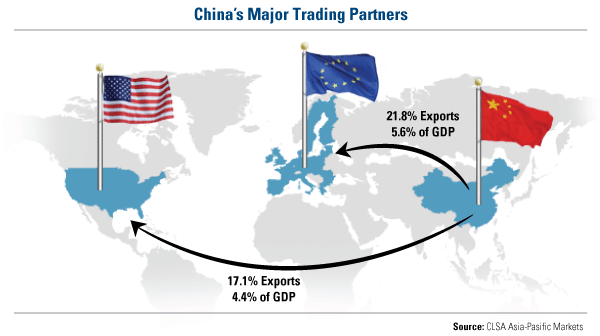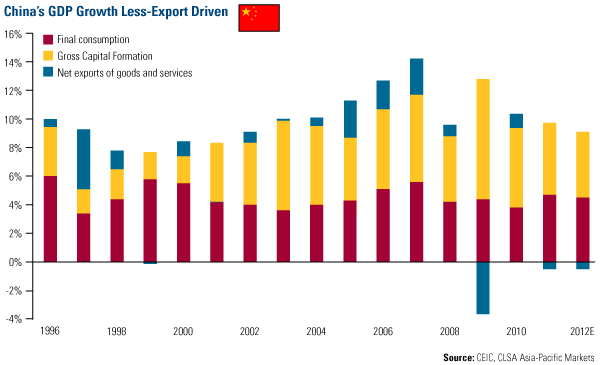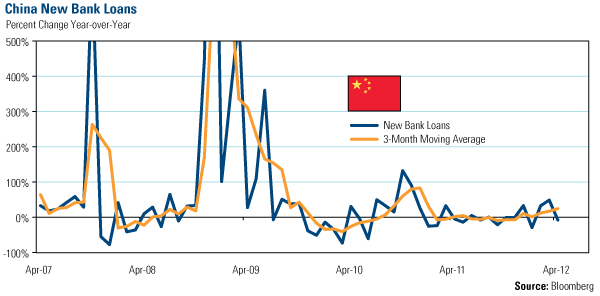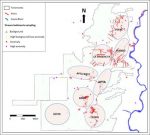
With Europe’s growth in a deep freeze, China is feeling the pain. While many think the U.S. is receiving most of the Chinese-made goods, Europe is actually China’s largest export partner. Nearly 22 percent of China’s exports head to Europe, contributing nearly 6 percent to China’s GDP; only 17 percent of exports from China are shipped to the U.S.
With fewer exports to Europe, China’s GDP growth could be affected, but probably much less than one might think. Listeners of our webcast a few months ago heard Andy Rothman from CLSA explain how China has become less dependent on the world for its growth.
As you can see from the chart below, CLSA had already assumed net exports of goods and services out of China to be negative this year because of slower growth from Europe and the U.S.

Yet, China clearly has the upper hand in controlling growth. Take a look at what happened in 2009 when exports declined dramatically: the government stepped in with a massive stimulus package devoted to bank lending and infrastructure construction. This effort significantly boosted overall GDP growth and “pushed the Chinese economy out of a deep slump,” says research firm BCA Research.
Despite net exports falling about 4 percent in 2009, GDP actually grew more than 12 percent.
China won’t put the pedal to the metal like it did in 2009, though. Premier Wen Jiabao recently said that the government “should continue to implement a proactive fiscal policy and a prudent monetary policy, while giving more priority to maintaining growth,” according to Bloomberg News. China is more like Goldilocks: The government wants the economy to be not-too-hot or not-too-cold.
The important thing to remember is that the government will want to avoid the expansion that was “associated with the earlier plan that led to higher CPI, asset price inflation and a surge in lending to non-priority projects,” says J.P. Morgan. Rather, the focus is on making sure the country shifts to a “more sustainable trajectory of growth,” says the research firm.
With the renewed eurocrisis, “Chinese authorities are currently facing an extremely complex and unpredictable situation,” says BCA. They’ll continue to monitor the situation and not make any drastic moves; rather, “Chinese authorities will stay on high alert and act promptly to rescue growth in case of external shocks,” says BCA.
New bank loans are down 7.8 percent year-over-year as of May 11, which we believe was the primary reason that China cut the required reserve ratio (RRR) on May 12. J.P. Morgan agrees, saying that together with the RRR cuts, “the seeming start of a new cycle of public spending and consumer stimulus should help to boost loan demand in the economy.”

Looking at the five year data above, all factors are near their lows and below their 3-month moving averages. In whatever shape or form, we expect policy easing to continue.
What appears to be overlooked by the mountain of negative economic news is the fact that China’s stock market is outperforming. In May, the A shares were the best-performing equities among all the developed and emerging stock markets we track. For the year, China’s investors still hold onto a gain of 7 percent, putting the country among the top half of the emerging markets and above all developed markets. This bifurcation may be signaling that the worst is behind us.
Keep in mind that negative news in the media may be a danger sign to some people; to Chinese policymakers, it’s a signal to act.
We believe the next government policy cycle might be just around the corner. In fact, we’ve already seen indications of stimulus from China, such as giving the “green” light to car buyers. Perhaps the European Central Bank and the Federal Reserve will follow suit to avoid a repeat of the last few summers.
By Frank Holmes
Frank Holmes is chief executive officer of U.S. Global Investors – a registered investment adviser that manages approximately $2.8 billion. The information provided herein has been provided to MiningFeeds.com by the author and, as such, is subject to our disclaimer: CLICK HERE.



 Follow us on Twitter
Follow us on Twitter Become our facebook fan
Become our facebook fan











Comments are closed.